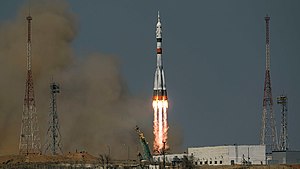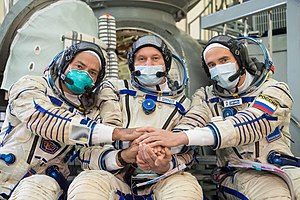
Back Sojuz MS-18 BS Soiuz MS-18 Catalan Sojuz MS-18 Czech Sojus MS-18 German Soyuz MS-18 Spanish سایوز اماس-۱۸ Persian Soyouz MS-18 French Soiuz MS-18 Galician סויוז MS-18 HE Sojuz MS-18 Italian
 Y. A. Gagarin launches atop a Soyuz-2.1a | |
| Names | ISS 64S |
|---|---|
| Mission type | Crewed mission to ISS |
| Operator | Roscosmos |
| COSPAR ID | 2021-029A |
| SATCAT no. | 48159 |
| Mission duration | 190 days, 20 hours and 53 minutes |
| Spacecraft properties | |
| Spacecraft | Soyuz MS no. 748 Y. A. Gagarin [1][2] |
| Spacecraft type | Soyuz MS |
| Manufacturer | RSC Energia |
| Crew | |
| Crew size | 3 |
| Launching | |
| Landing | |
| Callsign | Kazbek [3] |
| Start of mission | |
| Launch date | 9 April 2021, 07:42:41 UTC[4][5][6] |
| Rocket | Soyuz-2.1a |
| Launch site | Baikonur Cosmodrome, Site 31 |
| Contractor | Progress Rocket Space Centre |
| End of mission | |
| Landing date | 17 October 2021, 04:35:44 UTC |
| Landing site | Kazakh Steppe, Kazakhstan |
| Orbital parameters | |
| Reference system | Geocentric orbit |
| Regime | Low Earth orbit |
| Inclination | 51.66° |
| Docking with ISS | |
| Docking port | Rassvet nadir |
| Docking date | 9 April 2021, 11:05 UTC [6][3] |
| Undocking date | 28 September 2021, 12:21 UTC |
| Time docked | 172 days, 1 hour and 16 minutes |
| Docking with ISS (Relocation) | |
| Docking port | Nauka nadir |
| Docking date | 28 September 2021, 13:04 UTC |
| Undocking date | 17 October 2021, 01:14:00 UTC |
| Time docked | 18 days, 12 hours and 10 minutes |
 Mark Vande Hei, Oleg Novitskiy and Pyotr Dubrov | |
Soyuz MS-18 (spacecraft named "Y. A. Gagarin") was a Soyuz spaceflight that was launched on 9 April 2021 at 07:42:41 UTC.[4][7] It transported three members of the Expedition 64 crew to the International Space Station (ISS). Soyuz MS-18 was the 146th crewed flight of a Soyuz spacecraft. The launching crew consisted of a Russian commander, a Russian flight engineer, and an American flight engineer of NASA.[8][9][10][11] The spacecraft returned to Earth on 17 October 2021 following 191 days in space.[12] The flight served as the landing vehicle for the Russian film director Klim Shipenko and actress Yulia Peresild who launched to the ISS aboard Soyuz MS-19 and spent twelve days in space in order to film a movie, Vyzov (Russian: Вызов, lit. 'The Challenge').[13][14][15]
On 9 March 2021, Roscosmos announced that, at NASA's request, they would alter the existing flight plan to include Mark Vande Hei instead of Sergei Korsakov in the main crew and Anne McClain instead of Dmitriy Petelin in the backup one effectively extending NASA astronauts' flights on Soyuz spacecraft for at least another flight.[16][17] This arrangement was an in-kind service for the supplemental crew transportation service between NASA and Roscosmos, without any financial exchange between the two agencies.[18][19]
- ^ Zak, Anatoly (13 March 2021). "Planned Russian orbital launches in 2021". RussianSpaceWeb.com. Archived from the original on 14 March 2021. Retrieved 14 March 2021.
A Soyuz-2-1a rocket to launch the Soyuz MS-18 spacecraft (Vehicle No. 748, ISS mission 64S)...
- ^ Pearlman, Robert (23 March 2021). "Russia's next space station-bound Soyuz named for first cosmonaut". collectSPACE. Archived from the original on 27 March 2021. Retrieved 27 March 2021.
Roscosmos cosmonauts Oleg Novitsky and Pyotr Dubrov, together with NASA astronaut Mark Vande Hei, are set to lift off to the International Space Station on Russia's Soyuz MS-18 spacecraft, which has been named the "Y.A. Gagarin"
- ^ a b Becker, Joachim Wilhelm Josef. "Soyuz MS-18". Space Facts. Archived from the original on 24 March 2021. Retrieved 24 March 2021.
International Flight No. 321; Soyuz MS-18; Kazbek
- ^ a b Cite error: The named reference
NextSFwas invoked but never defined (see the help page). - ^ Cite error: The named reference
rsw20201201was invoked but never defined (see the help page). - ^ a b Cite error: The named reference
tweet20210409was invoked but never defined (see the help page). - ^ Cite error: The named reference
rsw2021was invoked but never defined (see the help page). - ^ Cite error: The named reference
anik1982_20200228was invoked but never defined (see the help page). - ^ Cite error: The named reference
ria_20200306was invoked but never defined (see the help page). - ^ Cite error: The named reference
anik1982_20200509was invoked but never defined (see the help page). - ^ Cite error: The named reference
TASS20200312was invoked but never defined (see the help page). - ^ Zak, Anatoly (2 June 2021). "Soyuz MS-18 mission to support ISS expansion lifts off". RussianSpaceWeb.com. Retrieved 22 August 2021.
- ^ Cite error: The named reference
tass20201102was invoked but never defined (see the help page). - ^ "Выбраны 20 претенденток на роль в фильме, который будут снимать на МКС" (in Russian). Интерфакс. 9 March 2021.
- ^ "Фильм "Вызов": итоги медкомиссии" (in Russian). Roscosmos. 13 May 2021.
- ^ "Новости. Астронавт NASA назначен в экипаж корабля "Союз МС-18"". roscosmos.ru (in Russian). Roscosmos. 9 March 2021. Retrieved 9 March 2021.
- ^ Brown, Katherine (8 March 2021). "NASA Assigns Astronaut Mark Vande Hei to Space Station Crew". NASA. Retrieved 22 March 2021.
 This article incorporates text from this source, which is in the public domain.
This article incorporates text from this source, which is in the public domain.
- ^ "NASA Weighs Options for Additional Crew Transportation for Spring Soyuz Mission to Space Station". NASA. 9 February 2021. Retrieved 10 March 2021.
 This article incorporates text from this source, which is in the public domain.
This article incorporates text from this source, which is in the public domain.
- ^ Foust, Jeff (10 March 2021). "NASA confirms plan to fly astronaut on upcoming Soyuz mission". SpaceNews. Retrieved 10 March 2021.